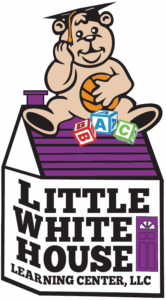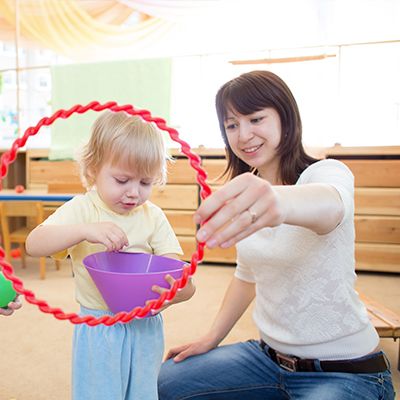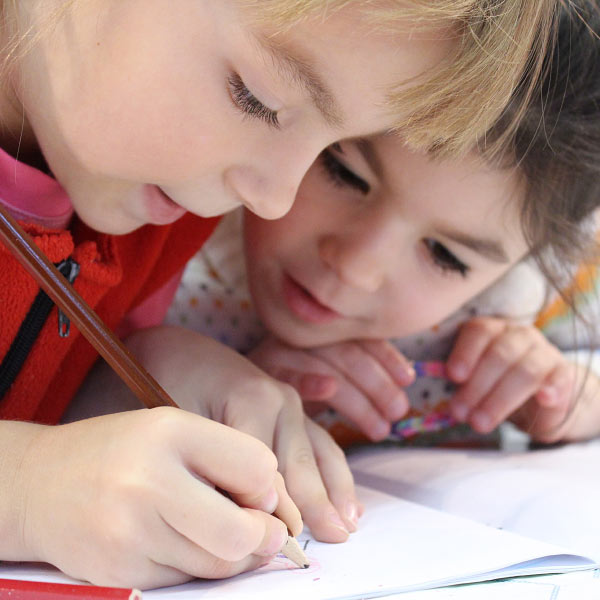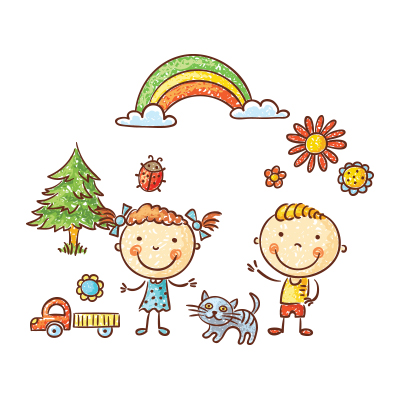
Learning Should Always Be Fun
Little White House Learning Center located Milford CT has over 50 years experience in quality childcare. We provide a safe, loving, and nurturing environment for children 6 weeks to 6 years. We encourage all children to be creative, inquisitive, and social learners. At Little White House, we form a partnership with the parents to provide the best care and educational experience possible.
Our Programs
Infants
Our loving and caring teachers create a nurturing environment where infants can safely develop foundational physical skills and emotional connections. Each child builds meaningful relationships with their caregivers and begins to form early bonds with peers.
Recognizing that every infant is at a unique stage of development, we tailor daily schedules to meet each child’s individual needs. Bottles, feedings, and naps are planned based on arrival times and the natural rhythms of the child. Diapers are changed every two hours or more frequently as needed.
Developmental skills introduced in the infant room include:
- Forming secure attachments with teachers
- Using senses to explore the environment
- Expressing needs through simple vocalizations and movements
- Engaging in tummy time to strengthen core muscles for rolling, sitting, crawling, and walking
- Practicing fine motor skills by holding and manipulating objects intentionally
Tummy time plays a critical role in physical development, helping babies gain the strength needed for key milestones like lifting their heads, rolling over, and eventually crawling and walking.
We follow safe sleep guidelines recommended by the American Academy of Pediatrics to ensure the safety and well-being of every infant.
Strong communication with families is a cornerstone of our program. Teachers provide daily updates through the Procare app, sharing valuable information about diaper changes, feedings, naps, and activities throughout the day.
Toddlers
At The Little White House, we believe toddlers learn best through direct, hands-on experiences with people, objects, events, and ideas. We encourage exploration of the world around them and embrace the philosophy that children learn through play. A caring and supportive environment is essential for toddlers to thrive.
Our toddler program focuses on key areas of development, including gross motor skills, language growth, and social-emotional development.
Developmental Needs
We recognize that toddlers are growing rapidly in many areas. Our schedules are designed with attention to each child’s physical, social, emotional, and cognitive development.
Structure and Flexibility
A well-balanced day includes both structured activities and opportunities for free play. This balance allows for predictability while also honoring a toddler’s need for discovery and independence.
Individualization
We adapt schedules and activities as needed to meet the unique needs of each child, ensuring they feel supported and successful throughout the day.
Communication
Ongoing communication between teachers and parents is vital. Through the ProCare app, families receive daily updates including curriculum highlights, activities, and care routines.
Our classroom environment promotes self-confidence and self-esteem through positive reinforcement and individualized attention. Each month, toddlers are introduced to new concepts such as a color, shape, songs, and books. These themes are reinforced through music, art, and dramatic play—providing opportunities for creative expression and social interaction.
Loving, nurturing relationships with caregivers form the foundation of a toddler’s experience. These bonds help children learn how to treat others and build the groundwork for healthy, positive relationships.
3 & 4 Year Old Pre-School
Our curriculum for 3- and 4-year-olds is thoughtfully developed using the Connecticut Early Learning and Development Standards (CT ELDS). These standards guide our planning across eight key developmental domains:
- Social and Emotional Development
- Physical Health and Development
- Language and Literacy
- Creative Arts
- Mathematics
- Science
- Cognition
- Social Studies
By weaving these domains together, we provide a comprehensive, engaging curriculum that supports each child in reaching their full potential.
We believe all children thrive in rich learning environments—both at home and in early learning settings. Our program emphasizes self-help and independence to promote self-esteem and a strong sense of identity.
Children learn best when their basic needs are met. These needs include physical and mental health, safe and nurturing environments, positive relationships, and a sense of belonging. We are committed to providing a setting where every child feels secure and valued.
Young children build their understanding of the world through exploration and engagement. We offer a variety of materials, experiences, and interactions that encourage curiosity and active learning. Schedules and activities are adapted as needed to meet individual needs, ensuring each child feels supported and successful throughout the day.
Essential life skills—such as taking turns, resolving conflicts, and following classroom rules—are part of our daily routine. These experiences build social competence and emotional resilience.
Communication between school and families is a cornerstone of our program. We utilize developmental profiles throughout the year to assess each child’s social, emotional, and academic progress. Families receive daily updates through the ProCare app, which shares details about classroom activities, curriculum, and special events. The app also allows parents to view photos and stay connected—whether they’re at home, at work, or on the go.
Transitional Kindergarten Pre School
Social/Emotional
Our Transitional Kindergarten program is designed for children with birthdays after September 1st who are not yet age-appropriate for kindergarten. This unique year offers children the gift of time to grow—socially, emotionally, and academically—before entering a traditional kindergarten setting.
The program places a strong emphasis on social and emotional development, while also introducing kindergarten-level academics in a developmentally appropriate way. Children are encouraged to explore and express their own thoughts and feelings, and they begin to show empathy toward their peers. Life skills such as taking turns, resolving conflicts, understanding and following basic classroom rules are key components of the daily routine.
Students also develop an awareness of diversity in themselves and others. They demonstrate inclusion and fairness through both actions and words. Cooperative play provides opportunities for conflict negotiation, encouraging students to consider the needs and interests of others.
Daily Schedule
Arrival and Welcome:
- Warm greetings: Greet each child and parent warmly to create a positive transition.
- Free play: Allow some unstructured playtime to help children adjust and explore.
Morning Activities:
- Morning snack: Parents provide a healthy snack option.
- Group time: Engage children in activities like singing, storytelling, or learning about colors and shapes.
- Activity centers: Offer a variety of centers for different learning styles and interests.
- Outdoor play: Provide ample time for physical activity and exploration.
Lunch and Nap Time:
- Lunch: We ask parents to provide a balanced and nutritious meal.
- Nap time: Create a calm and quiet environment for rest, with comfort items like blankets or stuffed animals.
Afternoon Activities:
- Afternoon snack: Parents provide a healthy snack to keep energy levels stable.
- Free play: Allow children to engage in independent play or group activities. Children enjoy interacting outside on our playgrounds with fun and engaging playscapes, activities and toys.
- Group time: Another opportunity for structured activities and learning.
Pick-Up:
- Warm goodbyes: Ensure a pleasant transition back home
Work Habits & Curriculum
At Little White House, we focus on nurturing the whole child through a developmentally appropriate, engaging, and well-rounded curriculum.
Language and Literacy
Early exposure to reading and related activities—such as reading aloud—helps children build vocabulary, comprehension, and a lifelong love of reading. These experiences support both cognitive and social-emotional development. Foundational skills like phonemic awareness, print awareness, vocabulary, and comprehension are key predictors of future academic success.
Math
Math in preschool plays a vital role in developing essential cognitive skills such as problem-solving, critical thinking, and logical reasoning. These foundational skills are crucial for future academic success and are woven into daily routines through playful and meaningful activities.
Science
Science education nurtures a child’s natural curiosity and builds critical thinking abilities. It encourages exploration, enhances observation and communication skills, and helps children make sense of the world around them—laying the groundwork for future learning across all subjects.
Following Directions & Problem Solving
Students develop the ability to follow increasingly complex directions, demonstrating an understanding of multi-step instructions. Problem solving and experiencing success are essential for growth. Curiosity and an interest in how things work support the development of cause-and-effect thinking. These skills are fostered through engaging activities in science, literacy, and music.
Family Partnerships & Assessment
Teachers work in partnership with parents to support each child’s learning both in the classroom and at home. Daily communication is shared with families, highlighting the curriculum introduced, books read, activities completed, and music and movement experiences. Students are regularly assessed, and progress is communicated through report cards.
What Parents Say
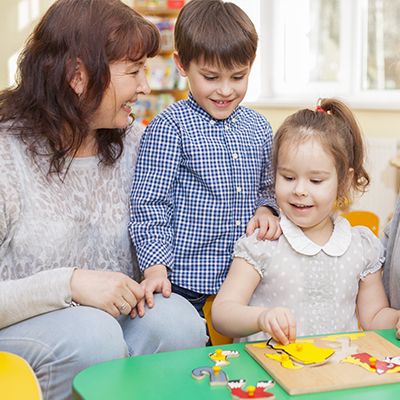
I am a parent of 2 active boys ages 18 months and 4 years. My children attend Little White House . Ms Joan and Ms Judy care for my younger son. They somehow find time between diapers, wiping noses and entertaining their class to do projects. I cherish the hand prints and was so excited to heat my son say “dot dot dot” for dot painting My older son is in the fours program, I can see that in the work be brings home they are getting him ready for the expectations of Kindergarten. The teachers throughout the school seem to have a passion for their job and a love of children.

It is never an easy decision to place your child in daycare. This is the challenge I faced with my newborn daughter. Upon arrival for my tour at Little White House I was greeted enthusiastically by the director. She introduced me to the teachers that would be the main caregivers to my treasured daughter. I was able to come in prior to her start date with my child and set up her crib while the staff cared for her. I thought to myself that this is the perfect fit for our family. I felt comfort in knowing she will be loved, safe and nurtured.
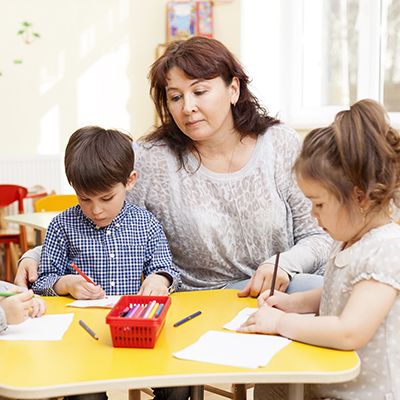
My sons attended Little White House in the 3 and 4 year old programs. The teachers really connected with me and kept me informed about the progress my children made and about the areas they had concerns with. They had a genuine love for the children and a true knowledge of the development expected in each class, I loved how they warmly welcomed us each morning and about our weekends on Monday mornings. My boys left with a strong foundation for Kindergarten and I applaud the staff at Little White House.
For More Information
Fill out the form below and our staff will give you a call!
